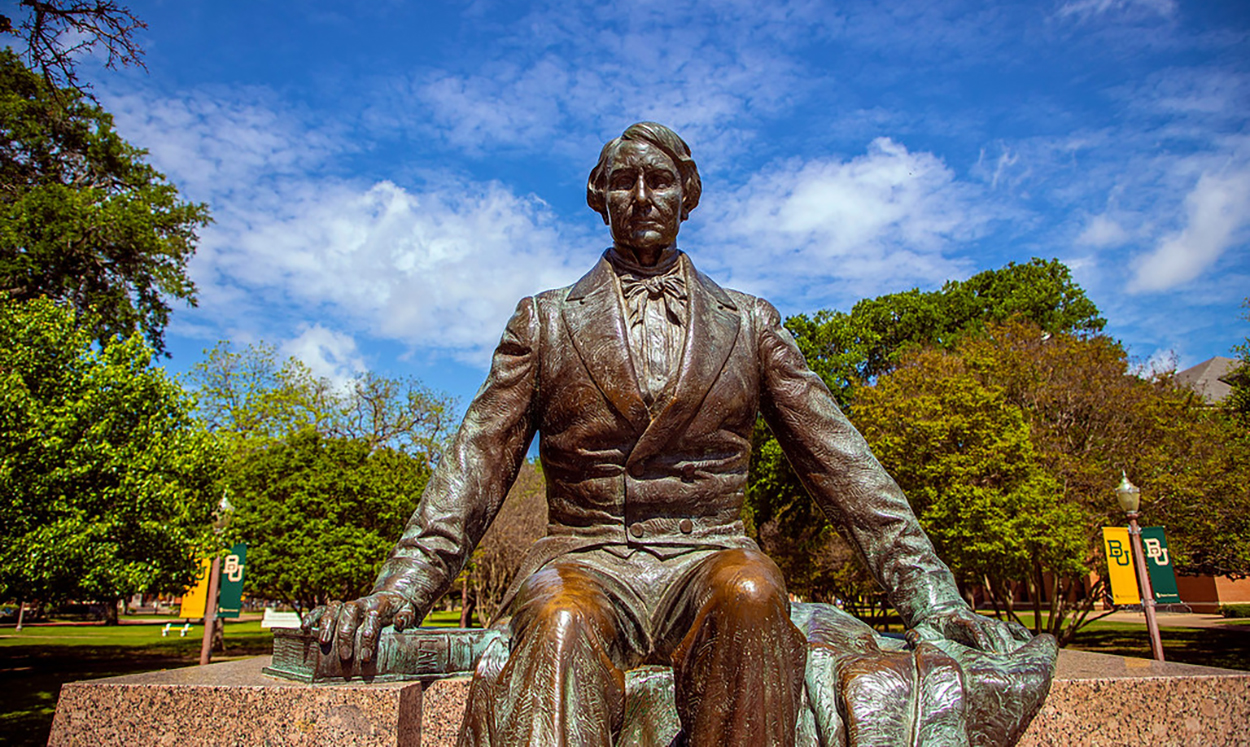
Baylor University regents accepted the final report from a commission formed to examine the university’s history and its founders’ links to slavery and racial injustice.
At their quarterly meeting, held via teleconference, the regents also instructed the university’s administration to develop an action plan for the board’s consideration based on the commission’s recommendations.
Baylor plans to release the commission’s full report by the end of March. First, the university will hold three forums as part of its ongoing “Baylor Conversation Series: Perspectives on Our History” on March 2, 9 and 16.
Each forum will be held from 6 p.m. to 8:30 p.m. on Zoom and include panelists from universities in Texas and other experts to discuss slavery in the United States, slavery in Texas and among Texas Baptists, and the historical findings of the commission and the framework for the recommendations.
“The commission has given a great gift to Baylor, one in which racial equality is inextricably linked to our Christian mission and that reflects the voices and perspectives of all 26 diverse members of the commission in the final report and recommendations,” said Board Chair Mark Rountree of Dallas. “As we take the next steps in this process, the board is committed to providing a Christ-like compassion and dedication to equality, justice and conciliation at Baylor, throughout our state and nation and among all people.”
Slaveholders among early Baylor leaders
Last summer, Baylor’s board of regents passed a “Resolution on Racial Healing and Justice” that asserted the university’s Christian mission is “inconsistent with racism in any form,” but acknowledged some of the university’s founders and early leaders supported slavery.
In a February 2017 Waco Tribune Herald article, Baylor religion professor Chris van Gorder reported tax records showed Judge R.E.B. Baylor owned at least 20 slaves in 1860, and 11 of Baylor’s first 15 trustees were slaveholders. He also noted all of the university’s first buildings in Independence were built by slave labor.
Regents created the 26-member Commission on Historic Campus Representations at Baylor University to “review the historical context of the university and its connection to all statues, monuments, buildings and other aspects of the campus in reference to their physical location, placement and naming.”
The commission was given the charge to:
- Review the complete historical record and context of the university and its founders and early leaders, including historical connections to slavery and racial injustice.
- Propose a plan for documenting and communicating the complete history of Baylor and its founders and early leaders, including historical connections to slavery and racial injustice.
- Evaluate all statues, monuments, buildings and other aspects of campus within this complete historical context and in reference to the original intentions behind their physical location, placement and naming and provide observations for consideration.
- Prepare a final report to be provided to the board of regents and the president no later than Dec. 20, 2020.
The commission completed its report and presented it to Baylor President Linda Livingstone and the chair of the board of regents in December. In the weeks prior to the regularly scheduled board meeting, regents met in specially called sessions so the commission’s co-chairs and other members could present the report, which the regents then discussed at the Feb. 19 meeting.
Sign up for our weekly email newsletter.
The board passed a resolution expressing gratitude to members of the commission “for their extensive labor and prayerful deliberation in the course of successfully fulfilling their charge and providing this service, as volunteers, to the university and the Baylor Family.”
The resolution also recognized and expressed appreciation of both regents and the Baylor administration for the “extraordinary leadership, dedication and selfless service of the commission’s three co-chairs marked by humility, discernment, and prayer.”
It praised the three co-chairs—Regent Alicia D.H. Monroe; Gary Mortenson, dean of the Baylor School of Music; and Walter Abercrombie, associate athletics director—“for their care in fostering an environment in which the voices and thoughts of all 26 members of the commission were thoughtfully considered and reflected in this gift to Baylor.”
Administration to develop action plan
Regents charged the university administration to develop a proposed action plan regarding the Commission’s recommendations. The administration will provide a briefing for regents’ consideration and action in accordance with existing board policies and procedures, prior to the implementation of any recommendation.
“The commission’s report tells more than the story of Baylor’s history. It is a testament to the importance of telling the truth, of asking for forgiveness and of reaching out to others impacted by the institution of slavery in fulfillment of our Christian mission and in keeping with our Christian witness,” Livingstone said.
“We will take great care as we begin looking deeper at the commission’s recommendations to develop a proposed action plan for consideration by the board in the months ahead.”
Lori Scott Fogleman of Baylor University contributed to this article.
"accept" - Google News
February 23, 2021 at 01:02AM
https://ift.tt/37DWghb
Baylor regents accept commission report on school's history - Baptist Standard
"accept" - Google News
https://ift.tt/2YsXkRf
https://ift.tt/3d2Wjnc
Bagikan Berita Ini














0 Response to "Baylor regents accept commission report on school's history - Baptist Standard"
Post a Comment